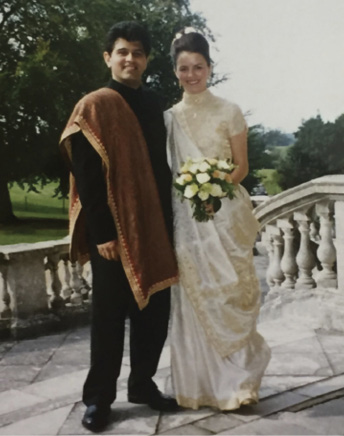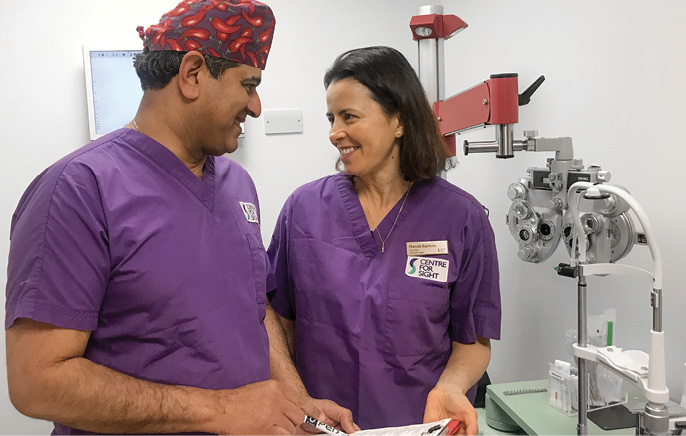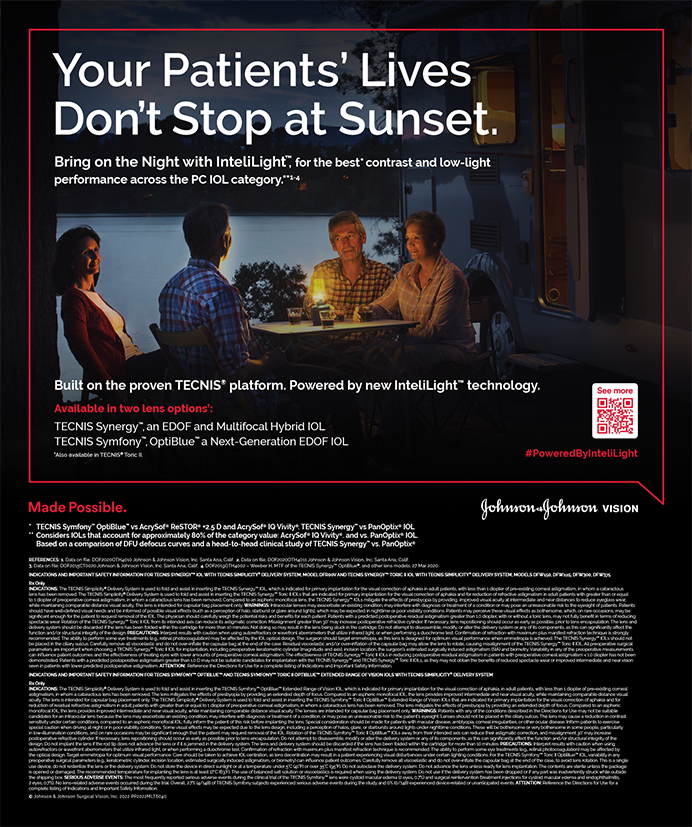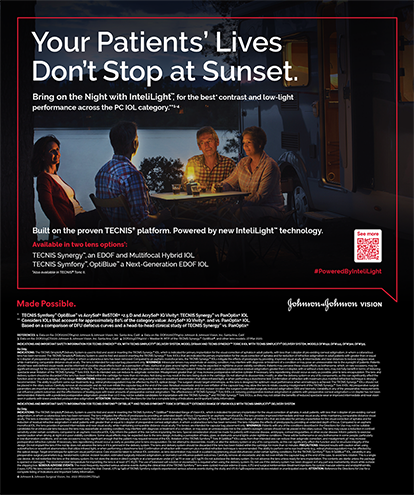When Marcela Espinosa-Lagana, MD, traveled to the office of Sheraz M. Daya, MD, FACP, FACS, FRCS(Ed), FRCOphth, to educate his staff on the use of a new laser, Sheraz was more impressed with her than the laser. The laser was a poor performer and had to be replaced three times. Eighteen months later, they were married, the laser was returned, and Marcela was out of a job until she joined the practice.
How did you meet?
Sheraz M. Daya, MD, FACP, FACS, FRCS(Ed), FRCOphth: We met in 1997, when I bought an excimer laser from LaserSight. Marcela was a medical advisor and application specialist for the company, and she came to educate our staff on use of the laser. At the outset, we had problems with the laser, but I knew as soon as I met Marcela that she was the one! After four lasers, one replacing the next, I married Marcela (Figure 1) and sent the laser back. Needless to say, Marcela lost her job.
Marcela Espinosa-Lagana, MD: My version is a lot longer and better over a few drinks!

Figure 1. A laser sale led to love at first sight.
Did you have any reservations about working with each other?
Marcela: No, never! We have different characters and styles, and we work at different paces, but, fortunately, as two practicing ophthalmologists, we see and operate on our patients fairly independently.
Sheraz: We met in a sense at work, and we were a team in more ways than one, so it was natural for us to work with each other in developing our practice and organization (Figure 2). I don’t think we ever considered any reservations about working together. I expect that, if we did not work together, we would hardly see each other.

Figure 2. Working together has allowed Drs. Daya and Espinosa-Lagana to spend valuable time together.
What role do you each play in the practice?
Marcela: I work as an ophthalmologist in the practice 4 days a week. I like to have Fridays off to do what I like (eg, learn Italian, meet friends, visit galleries). Besides that, I am one of the directors of the practice and really in the background, working hard to keep Sheraz down to earth!
Sheraz: I am, I suppose, the bulldozer in the practice. In addition to a heavy clinical load, I deal with direction and strategy, as well as placing a lot of reliance on a great team led by our operational director. I suspect what Marcela may be referring to is getting me to minimize the number of projects being entertained and not biting off more than I can chew.
How do you maintain balance with home obligations?
Marcela: This has been my principal responsibility. It has been a challenge figuring out how to balance growing children, their schoolwork, and keeping the home in order. Fortunately, besides my time doing a fellowship for a year and also commuting to work in Spain for 7 months (all as part of credentialing to work in the United Kingdom), I have worked part-time. This has allowed me time with the children. I have also been fortunate in always having help at home.
Sheraz: As many colleagues will confess, building a practice/organization is an all-consuming activity in the early years. I confess that I left the area of the home in Marcela’s capable hands. Once I left working for the UK National Health Service (NHS), I could control my time better and have been more involved with our children and the home.
What is the biggest challenge you face as a couple, and how do you overcome it?
Marcela: The biggest challenge was my ambitious husband embarking on building our flagship center in East Grinstead as well as another in our village in rapid succession while still working for the NHS. There were just not enough hours in the day, and he would usually go to bed at 2 am and do with very little sleep. That was not a healthy period on many fronts.
As for overcoming this, I am very patient and a believer in allowing time to take its course. Sheraz eventually left the NHS for other reasons, but it was a great move that helped everything fall into place.
Sheraz: Going from a mom-and-pop practice to a proper organization was a big challenge. As Marcela has indicated, we decided to build a bespoke facility, which was making me quite nervous in terms of finances and management. (Editor’s note: For more on the couple’s bespoke facility, see Practice Profiles)
To add to the stress, this was in progress at the time the recession hit, and getting financing to complete the project was difficult. We used all of our saved funds and, at the very last minute before crunch time, managed to get a loan to complete what was a multimillion-pound project.
Two things that provided me with considerable confidence were doing a boot camp on management at Yale Business School and completing the business growth program at Cranfield University. I highly recommend that colleagues who run their own show consider business training. The Physician CEO program at Northwestern University in Illinois, which is geared toward doctors, has been highly rated by several ophthalmic friends and colleagues.
What is the biggest reward?
Marcela: Working together has allowed us to spend more time with each other than we would otherwise. We have had some difficult times growing the practice during the past 20 years, but these challenges have helped us to become closer and to appreciate each other’s attributes. We are also very pleased to see our two children, now nearly young adults, grow into wonderful people.
Sheraz: Looking back, we are very thankful that we have been successful on a number of fronts, and we revel in being able to look after our patients well.
Along the journey to get where we are now, we have grown together as partners, and we treasure our precious family.




